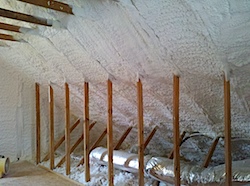I spent last Wednesday and Thursday in Northern Virginia in Earth Advantage training, learning more about green homes, green real estate, their respective relevance in the market and how best to help and advise my clients regarding such. Below the “fold” is a Storify I did and conversations I had during the sessions, but these are five big takeaways.
1 – Consumers (generally) don’t care how green a house is; the house could be painted with motor oil but if it costs them less they’ll buy it. In fact, making one green decision may lead to making less green decisions. (see also: Do Green Products Make Us Better People?)
2 – Green homes and energy efficiency matter. “How much does this house cost to run” is one of the number one questions my buyer clients ask, and this is more than a trend; it’s a way of life. See: Green-certified homes sell for 9% more, study in California finds
3 – I’d wager that a “miles per gallon” for homes will be common place in the next three years. I firmly believe that a “MPG for homes” would hurt resale value of existing, less-energy-efficient homes. The Department of Energy is funding programs such as LEAP and this Earth Advantage training and other such programs in order to create a market for energy efficient homes and products; I can make at least two arguments about this, one pro and one con. Either way, now would be a good time to learn about the SAVE* Act and see who supports and opposes it.
4 – There are more than 70 green home certifications across the country; Earth Craft, Energy Star, LEED are the most prominent in this part of the country. They’re all different; they all have different qualification systems and they’re all brands.
Heck, I’ve saved about $2k in heating bills since my home’s LEAP makeover.If you’re interested in retrofitting your home, now would be a good time to do so; start with an energy audit (ask me if you have questions about what that is … I might write a post about it soon) and look at the 0% interest Power Saver Loans offered by the UVA Credit Union;
Figure out how you might save locally by taking LEAP’s survey.
If you’re interested, spend some time (scroll to the bottom and work your way up) reading through the green real estate training Storify after the break.



